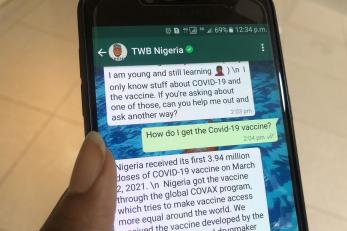Mercy Corps partners with Translators without Borders to develop COVID-19 chatbot

Reports from experts have cited misinformation as one of the major issues following the aftermath of the COVID‑19 pandemic. With increasing misconceptions at the community level affecting acceptance and response to the pandemic, the issue has been termed as infodemic by the World Health Organization. For communities in humanitarian settings, the dangers of misinformation is two-fold, fueling humanitarian issues arising from crisis situations and exacerbating inequalities for vulnerable populations.
To counter the impact of misinformation in an initiative led by Translators without Borders (TWB), Mercy Corps supported the development of a multilingual COVID‑19 chatbot that would help improve understanding, address rumors and access to factual information for people in Northeast Nigeria. The chatbot is named “Shehu,” a word that is used across all four languages in the region. Formally, it is an official title for a scholar, and refers to someone learned and knowledgeable.
Although the chatbot communicates in English, people can send questions and receive responses in three languages - English, Hausa, and Kanuri, with the fourth language (Shuwa Arabic) currently under development. Response on the tool is immediate and facilitates conversation, helping people to receive credible information more quickly and what action to take concerning rumors. It will respond to questions such as, “How can I catch COVID‑19?”, “If I feel sick, what should I do?”, and “Can vaccines prevent me from infecting others with COVID‑19?” Insights from the chatbot will help humanitarian responders understand what information people need, want and in what language, what information gaps exist, providing evidence for scaling up appropriate interventions.
“We are excited to launch Shehu in Northeast Nigeria. We hope that this tool will help people better access information they need and want, immediately and in their language,” says Ibrahim El-Yakub, TWB Chatbot Engagement Officer. “We want to encourage humanitarians to incorporate multilingual conversation tools into their programming, to improve two-way communication and accountability, ensuring people in Northeast Nigeria have better control of the information they need and want.”
Data and insights gathered anonymously from chatbot users will inform humanitarians about what kinds of questions people have about COVID‑19 and gaps in information. These insights will be available on a forthcoming dashboard that will monitor what questions are being asked, what languages are being used most often, and what topics are asked about most frequently. Humanitarian organizations can use this information to plan their communications―proactively addressing rumors about COVID‑19 and providing information that is relevant and needed.
The chatbot will initially be deployed among host communities and internally displaced people in Damboa and Maiduguri, Nigeria. TWB and Mercy Corps will use a hyperlocal approach, starting small and adapting the content and rollout based on insights gathered with the chatbot.
To use the chatbot, text +2347034146757 or click here to use WhatsApp in any of the four languages. Shehu will respond in the language that was used.
This project is supported by Creating Hope in Conflict: A Humanitarian Grand Challenge; a partnership of USAID, The U.K. government, and the Ministry of Foreign Affairs of the Netherlands, with support from Grand Challenges Canada.